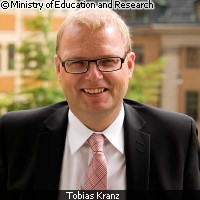Swedish presidency seeks to strengthen knowledge triangle
At a conference on 'The Knowledge Triangle Shaping the Future of Europe', hosted by the Swedish Presidency of the Council of the European Union in Gothenburg, Sweden, from 31 August to 2 September, EU Commissioner of Science and Research Janez Potocnik stressed the importance of strengthening universities and research institutions and making them better connected to 'a more competitive business sector'. Dr Potocnik pointed out that it is critical for European universities to modernise, and that rejuvenating these institutions is in the hands of the Member States. His sentiments reflected those of the conference host. The Swedish presidency plans to encourage interaction between education, research and innovation by promoting better coordination between these three sides of the 'knowledge triangle'. According to Tobias Kranz, Swedish Minister for Higher Education and Research, a modern university must be 'open to new ideas, to new methods and to new ways of cooperating,' and it must enjoy autonomy. 'An open, modern university must be free to explore all the new opportunities,' he said, adding that 'in many ways the old structures are holding universities back.' He cited the example of Sweden, where universities have to ask the government for permission to do anything out of the ordinary. Of the three points of the triangle, the presidency plans to focus specifically on the role of education. This objective had the wholehearted support of the Commissioner. Dr Potocnik described the complex role that must be played by European universities in building the knowledge triangle, and emphasised the need for stronger collaboration at European level in terms of funding agencies, student mobility, mutual recognition of curricula, European doctoral training, professionalisation of university managers, development of a code of good practice for international cooperation and opening up recruitment to international staff and students. Dr Potocnik raised the topic of ranking universities in order to better understand the contribution they are making. 'If we want to measure and compare excellence with other institutions, we must have a workable system to do it with,' he said. 'We need to be able to reflect the reality of the increasingly diverse nature of universities [...] and in this, clarity of purpose, choice of metrics and weightings will be critical.' On the subject of organising, connecting and funding graduate schools in the EU, he cited the example of the European Institute for Innovation and Technology (EIT), whose Knowledge and Innovation Community, he said, is a concept that these emerging institutions should consider following. Dr Potocnik also reiterated his belief, expressed earlier this year at the Competitiveness Council, that more strategic and relevant research funding could be better achieved if funding institutions had in hand common guidelines for 'responsible external research funding'. The Commissioner stressed that for the research base to thrive in Europe, its universities must remain dynamic; universities, research institutions and business should make every effort to interact, cooperate, compete, develop and excel. 'Innovation capacity allied to higher education capability - this is what makes the world go round these days,' he said. According to Dr Kranz, Sweden has called for a shift in the EU-budget from agricultural subsidies to research investments. 'But we also need each Member State to invest more, because the pluralism of the research funding on the European continent is one of our big advantages,' he said. On the subject of innovation, Dr Potocnik cited several examples, including the EIT's promotion of 'cross-fertilisation and cross-funding between itself and other [EC] and national initiatives and programmes', including universities. Dr Kranz, also speaking on innovation, said that universities 'could and should do more to help their employees commercialize their inventions'. He added: 'We must make it easier to have multiple careers. It must be possible to travel back and forth between a career in the academy and one in the private sector.' Dr Potocnik called attention to a communication on innovation to be adopted by the Commission on 2 September. 'This will be something of an innovation 'stock take',' he said. 'It will look back and assess to what extent our previous innovation strategies have been effective and how they can help us prepare to innovate better in the future. This will be a crucial document - not just for this presidency, but for the coming years as our need for innovation and innovative policies evolves with the world around us.' 'I think all of us here today agree that education, research and innovation are vital to Europe's future,' concluded Dr Kranz. 'Some would argue that introducing new words like 'the knowledge triangle' is just cosmetics. I would however say that the purpose is bigger than a new word to put on posters. The term 'knowledge triangle' emphasizes the need for a joint European strategy on this field.' The process of strengthening the knowledge triangle by modernising European universities is expected to strengthen institutions of higher education, make the business sector more competitive and benefit socioeconomic development in general.
Countries
Sweden



